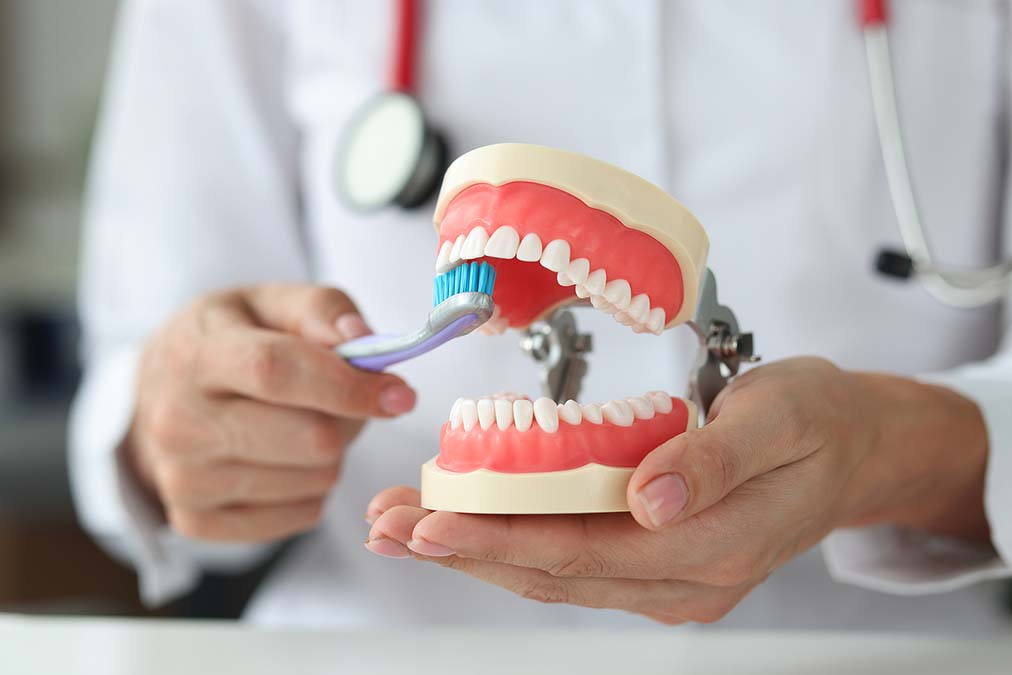 When it comes to gum disease, there is no shortage of advice and “magical solutions”.
When it comes to gum disease, there is no shortage of advice and “magical solutions”.
So a new study published in the Journal of the International Academy of Periodontology put these methods to a test and found out what actually works and which ones simply waste time.
Researchers at the State University of New York at Buffalo searched through medical journals and reviewed the available studies on basic dental care.
The following cleaning methods are backed by their research:
- 1. Brushing your teeth twice a day to remove dental plaque.
2. Using interdental brushes and triangular wood sticks or water picks.
3. Using mouth washes containing chlorhexidine gluconate (a medication that can cause severe allergic responses), cetylpyridinium chloride (a type of medication that can stain your teeth), Listerine, or antibacterial and anti-inflammatory essential oils like lemongrass, tea tree, eucalyptus, thyme, clove, rose, and peppermint.
4. While interdental toothpicks don’t combat gum inflammation, gentle probing with one can help diagnose bleeding and gum disease.
They also found many common cleaning methods on which the research was mixed or undecided. These methods have not been proven to be ineffective, so let’s just call them unproven:
- 1. Flossing can work for people who have very small spaces between their teeth, but it’s not clear that flossing works for most people.
2. Electric or powered tooth brushes work just as well as normal tooth brushes, so they don’t hold any extra benefit.
3. Medicines like sodium benzoate, stannous fluoride, hexetidine, and hydrogen peroxide.
4. Probiotics.
5. Dietary supplements.
6. Antioxidants.
7. Smoking cessation.
8. Scaling, which is the professional removal of plaque with a scraper.
The scientists found that triclosan was definitely harmful, as it can cause cancer, notwithstanding its ability to combat inflamed gums and bacterial plaques. It has now been removed from most tooth pastes.
For the same reason, it is probably a bad idea to use the other synthetic drugs like chlorhexidine gluconate and cetylpyridinium chloride, just in case they may later turn out to have serious side effects too.
Therefore, if you brush your teeth every day with a normal toothbrush and use an interdental brush to remove difficult-to-reach plaque, you are off to a good start.

 Overcoming IBD
Overcoming IBD Multiple Sclerosis
Multiple Sclerosis Banishing Bronchitis
Banishing Bronchitis Gum Disease Gone
Gum Disease Gone Overcoming Onychomycosis
Overcoming Onychomycosis Neuropathy No More
Neuropathy No More The Prostate Protocol
The Prostate Protocol Brain Booster
Brain Booster
 Ironbound
Ironbound
 Solution for Shingles
Solution for Shingles
 The Bone Density Solution
The Bone Density Solution
 The Ultimate Healing Protocol
The Ultimate Healing Protocol
 The Parkinson's Protocol
The Parkinson's Protocol
 The Chronic Kidney Disease Solution
The Chronic Kidney Disease Solution
 Overthrowing Anxiety
Overthrowing Anxiety The Fatty Liver Solution
The Fatty Liver Solution The Hypothyroidism Solution
The Hypothyroidism Solution
 The End of Gout
The End of Gout The Blood Pressure Program
The Blood Pressure Program
 The Oxigized Cholesterol Strategy
The Oxigized Cholesterol Strategy
 Stop Snoring And Sleep Apnea Program
Stop Snoring And Sleep Apnea Program
 The Arthritis Strategy
The Arthritis Strategy The Vertigo & Dizziness Program
The Vertigo & Dizziness Program The 3-Step Diabetes Strategy
The 3-Step Diabetes Strategy Hemorrhoids Healing Protocol
Hemorrhoids Healing Protocol The Erectile Dysfunction Master
The Erectile Dysfunction Master Weight Loss Breeze
Weight Loss Breeze The IBS Program
The IBS Program The Insomnia Program
The Insomnia Program The Migraine and Headache Program
The Migraine and Headache Program The Neck Pain Solution
The Neck Pain Solution The Menopause Solution
The Menopause Solution The Ejaculation Master
The Ejaculation Master The TMJ Solution
The TMJ Solution The Acid Reflux Solution
The Acid Reflux Solution The Fibromyalgia Solution
The Fibromyalgia Solution The Psoriasis Strategy
The Psoriasis Strategy